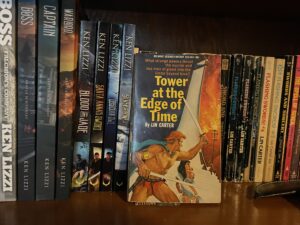
The indefatigable Lin Carter published a slender novel in 1968 titled Tower at the Edge of Time. I have been open in my admiration for Mr. Carter’s gifts as a scholar, editor, and stylistic imitator. I even enjoy, on occasion, his more independently innovative works. That being said…Well, let me just get into it.
Tower is an attempt to create a Burroughsian, John Carteresque superman who acts upon a stage larger than Barroom. That larger stage is part of the problem. Edgar Rice Burroughs focused several books on one planet. Carter tries to fit a galaxy into 140 pages. This book is at best a bagatelle. It is a carnival barker of a tale that promises much and delivers little but glitter, smoke, and bombast. It is, as indicated, short. That is both its strength and its downfall. The merciful brevity keeps the reader moving and ignoring the fact that the whole narrative edifice is a latticework of illogic, the gaps passed over by tenuous interconnecting spans of the Rule of Cool. The downside is that there is very little story at all. Interesting character interactions seldom pay off. Much of the page length is just a collection of words that create an evocative image when placed together, but are never developed. Examples gleaned at random: Onolk the Space God, Red Hills in the Land of Fire, The Autarchate of the Orion Worlds. Carter never develops these people or places, seeming to think that hurling several hundred names at the reader is sufficient world building. It is like reading a menu that you are unable to order from.
What intrigued me most was that Carter did seem to like a few of these notions and phrases enough to expand on them in his World’s End series; the Tigermen for instance, or the Pseudowomen. I also wonder if Gary Gygax read this before cobbling together the (seldom used, thankfully) psionics rules in the Dungeon Masters Guide. Tower was written during that period when speculative fiction authors seemed obsessed with psychic powers, and Carter treats us to a couple of chapters worth of his hero’s mental feats, some of which seem to align perfectly with certain gifts Gygax enumerated.
But these points of interest are extraneous to the book itself, almost academic. The novel itself is…empty. There is no there, there. It culminates in a sort of bland, After School Special message. Nothing is paid off. None of the thousand intriguing people, places, historical events, or political concepts are developed at all. It is as if Frank Herbert’s entire Dune series was abridged and redacted to a collection of character names, planets, and organizations, with all depth, philosophy, and character development excised.
That said, a few of the set piece fights and chases were kind of fun. And, as noted, it is short.
Some of my books are relatively short. Thick As Thieves, for example is under 70,000 words. Give that one a try. Let me know what you think.
